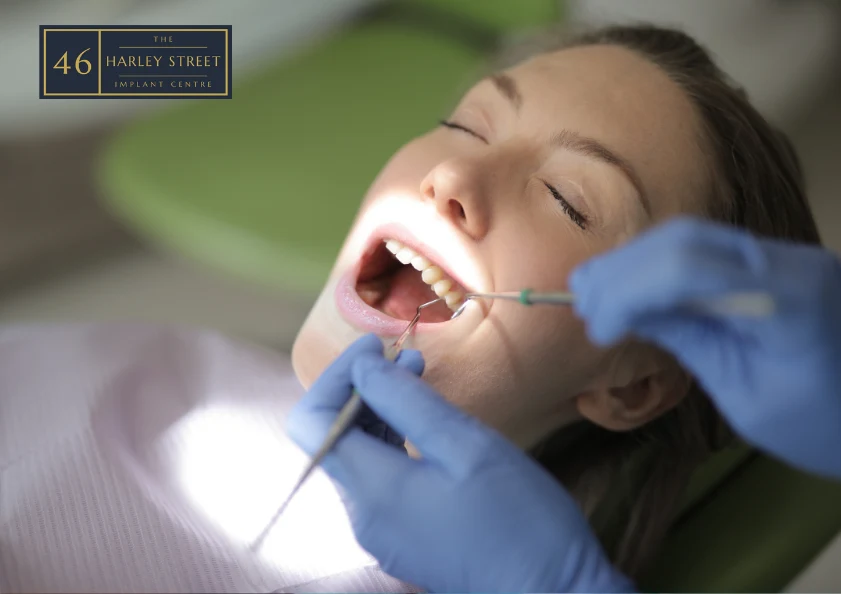Wisdom Tooth Removal Cost UK. A Complete Guide Wisdom teeth are the last molars to appear in the mouth, usually developing between …
Are Dental Implants Painful? What You Need to Know
If you’re considering dental implants, one of the questions likely at the forefront of your mind is, “Are dental implants painful?” It’s a valid concern, especially considering the delicate nature of the mouth. Let’s delve into this question and explore the various aspects surrounding implants, from their purpose to the steps involved in the process, along with essential aftercare tips.

What are dental implants?
Dental implants are artificial tooth roots made of titanium, surgically positioned into the jawbone beneath your gums. They provide a stable foundation for replacement teeth, which can be either permanent or removable. These implants are designed to fuse with the jawbone over time, mimicking the natural structure of a tooth root and providing unparalleled stability for the attached prosthetic tooth or teeth. Unlike traditional bridges or dentures, dental implants offer a long-term solution that looks, feels, and functions like natural teeth.
Understanding the procedure
Before delving into the pain aspect, understanding the procedure itself can alleviate some concerns. Dental implant surgery typically involves several stages:
Consultation and Examination: Your dentist will assess your oral health and discuss your treatment options. This initial consultation is crucial for determining if implants are suitable for you
Implant Placement: During this stage, the implant is surgically placed into the jawbone. While this may sound intimidating, local anaesthesia is administered to numb the area, ensuring you feel minimal discomfort during the procedure.
Osseointegration: After implant placement, a process called osseointegration occurs, during which the implant fuses with the surrounding bone tissue. This process may take several months, but it is essential for ensuring the stability and longevity of the implant
Abutment Placement: Once osseointegration is complete, an abutment is attached to the implant. The abutment serves as a connector between the implant and the replacement tooth or crown.
Placement of the Restoration: Finally, the replacement tooth or crown is placed onto the abutment, completing the implant restoration.
Understanding each stage of the procedure can alleviate anxiety and provide reassurance that dental implant surgery is a well-established and predictable process.
Why you might need dental implants
Considering dental implants but wondering if they’re necessary? Here are several reasons why you might need them:
- Missing Teeth: Implants are an ideal solution for replacing missing teeth, whether it’s a single tooth or multiple teeth. They offer stability and functionality comparable to natural teeth.
- Improved Chewing and Speech: Missing teeth can hinder proper chewing and may affect speech. Implants restore the ability to chew and speak comfortably.
- Preserving Jawbone Density: When a tooth is lost, the jawbone may deteriorate over time due to lack of stimulation. Implants mimic natural tooth roots, preserving bone density and preventing bone loss.
- Enhanced Aesthetics: Implants not only restore function but also change the appearance of your smile. They blend seamlessly with your natural teeth, providing a natural-looking solution for missing teeth.
- Preventing Shifting of Teeth: Gaps left by missing teeth can cause adjacent teeth to shift out of position over time. Implants fill these gaps, preventing misalignment and maintaining proper tooth alignment.
- Durability and Longevity: With proper care, dental implants can last over 20 years, potentially indefinitely, making them a durable and cost-effective solution for tooth replacement.
- No Dietary Restrictions: Unlike removable dentures, implants allow you to enjoy your favourite foods without restrictions. They provide stability and comfort, allowing you to eat with confidence.
- Improved Oral Health: Implants are easy to maintain and do not require special cleaning procedures. They promote better oral hygiene by facilitating regular brushing and flossing.
- Enhanced Self-Confidence: Restoring your smile with implants can boost your self-esteem and confidence. You can smile, laugh, and speak confidently without worrying about gaps or missing teeth.
- Preservation of Facial Structure: Missing teeth can cause the face to appear sunken and aged. Implants support facial muscles and tissues, preserving your natural facial structure..
So.. are dental implants painful?
It’s natural to be concerned about pain during dental implant surgery. However, advancements in dental technology and anaesthesia techniques have made the procedure relatively comfortable for patients. Local anaesthesia is administered to numb the treatment area, ensuring you feel minimal discomfort during the surgery. Additionally, for patients with dental anxiety or those undergoing more complex procedures, intravenous (IV) sedation can be used to induce a state of deep relaxation, further minimising discomfort and anxiety.
How can IV sedation help with managing pain during dental implants?
For patients concerned about discomfort during dental implant surgery, intravenous (IV) sedation can offer a solution. IV sedation induces a state of deep relaxation, minimising anxiety and discomfort during the procedure. It is administered through a vein, allowing the dentist to adjust the level of sedation as needed. IV sedation is safe and effective, ensuring a comfortable experience for patients undergoing implant surgery. If you are a patient wondering “Are dental implants painful?” – visiting a practice that offers IV sedation may help reduce your anxiety and minimise any pain.
Recovery and aftercare
After dental implant surgery, it’s essential to follow your dentist’s instructions for proper recovery and aftercare. This typically includes:
-
Managing Discomfort: Some discomfort and swelling are normal after implant surgery. Your dentist may prescribe pain medication to help manage any discomfort during the initial healing period.
-
Maintaining Oral Hygiene: Good oral hygiene is crucial for preventing complications and ensuring the success of your implants. Brush and floss regularly, and use an antibacterial mouthwash as directed by your dentist.
-
Dietary Restrictions: In the days following surgery, stick to soft foods and avoid hard, crunchy, or sticky foods that may irritate the surgical site.
-
Follow-Up Appointments: Attend all scheduled follow-up appointments with your dentist to monitor the healing process and ensure the implants are integrating properly with the surrounding bone.
By following these guidelines and maintaining regular dental check-ups, you can ensure a smooth recovery and long-term success with your dental implants.
How can we help?
While the idea of dental implant surgery may seem daunting, the benefits can far outweigh any potential discomfort. With advancements in dental technology and techniques, these procedures are now more comfortable and efficient than ever before. By understanding the purpose of restorations, addressing common concerns, and adopting proper aftercare practices, you can achieve a successful outcome and regain confidence in your smile.
At the Harley Street Implant Centre, we only use the best-in class premium implants from Nobel Biocare. Our lead clinician, Dr Anthony James has placed over 4000 implants with a 99.7% success rate. Our team of dentists will be with you every step of the way on your dental implant journey and provide the care and information you need to look after them well.
Contact us to book an appointment and learn more about our dental implant services and how we can help transform your smile!
IV Sedation Myths : 3 Of The Most Common Myths Debunked
For many patients, the most difficult part of getting dental implants is not the surgery itself but making the decision to seek …
Non Surgical Wisdom Tooth Extraction Recovery
Non Surgical Wisdom Tooth Extraction Recovery: A Harley Street Guide Recovering from a non-surgical wisdom tooth extraction is usually straightforward, but knowing …
Why We Built a High-End Dental Implant Clinic from Day One, And Why It Matters for Your Care
When people hear that we built a high end dental implant clinic on Harley Street, the first question they often ask is …



